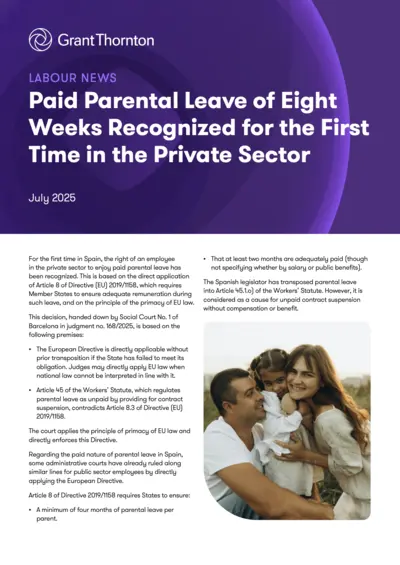
Parental leave of eight weeks is recognized as paid for the first time in the private sector
For the first time in Spain, the right of a private sector employee to enjoy paid parental leave has been recognized, based on the direct application of Article 8 of Directive (EU) 2019/1158, which requires Member States to ensure adequate remuneration during such leave, as well as on the principle of the primacy of EU law.
This decision, issued by the Social Court No. 1 of Barcelona in ruling No. 168/2025, is based on the following premises:
- That the European Directive is directly applicable, without prior transposition, if the State has failed to fulfill its obligation. Judges have the power to directly apply EU law when it is not possible to interpret national law in accordance with EU law.
- That Article 45 of the Workers’ Statute, which regulates parental leave as unpaid by providing for suspension of the employment contract, contradicts Article 8.3 of Directive (EU) 2019/1158.
The court applied the principle of the primacy of EU law and directly enforced the Directive.
With regard to paid parental leave in Spain, some administrative courts have already ruled in this direction concerning public employees, applying the European Directive directly.
Article 8 of Directive 2019/1158 requires Member States to guarantee:
- A minimum of four months of parental leave per parent.
- At least two of those months to be adequately paid (whether through salary or public benefit is not specified).
Spanish lawmakers have transposed this leave under Article 45.1.o) of the Workers’ Statute. However, it is regulated as an unpaid suspension of the contract, with no compensation or benefit.
The Social Court considered this insufficient to meet the European mandate. It therefore ruled in favor of directly applying the Directive and declared the employer’s obligation to remunerate the worker during this leave period.
This ruling changes the rules of the game for the business sector by imposing an economic obligation on companies:
- Companies must allow parental leave and recognize it as paid.
- Furthermore, the wording of the judgment suggests that companies may have to cover this cost themselves, as if the employee were actively working.
No appeal is allowed against this ruling, making it final in this specific case.
However, we are likely to see varying rulings from different courts on this matter.
Only the Supreme Court will be able to unify the legal doctrine and resolve the tension.
Spain ratifies ILO Convention 191
On July 1, 2025, the Council of Ministers approved a request to Parliament for authorization to ratify ILO Convention 191 concerning a safe and healthy working environment.
This Convention, adopted at the 111th Session of the International Labour Conference in 2023, was previously consulted with the most representative employer and union organizations. The text has now been submitted to the Spanish Parliament for approval and subsequent ratification.
The Convention incorporates occupational health and safety as a new fundamental right at work, updating eight existing ILO conventions and ensuring workers' right to a safe and healthy working environment.
From now on, any country that ratifies one of the eight updated conventions does so under its revised version.

Ongoing debate on severance pay in Spain
In June 2025, the European Committee of Social Rights issued a resolution stating that:
- The maximum limits set by legislation are not high enough to fully compensate the damage suffered by the victim or to deter employers.
- The current Spanish system may not sufficiently account for the real harm suffered by the affected employee, depending on the specific circumstances of each case.
The resolution also highlights:
- National courts cannot decide whether reinstatement is appropriate in a specific case, as the law either mandates reinstatement in null dismissals or allows the company or employee to choose. The Committee believes courts should be able to assess the suitability of reinstatement in consultation with the parties involved.
- In cases of unfair or null dismissal of temporary workers, the same rules apply as to permanent employees. The Committee holds that in these circumstances, the legal caps are still insufficient to compensate for the harm and deter the employer. The specific damage suffered may not be adequately addressed, partly because the possibility of receiving additional compensation is very limited.
Therefore, the Committee unanimously concludes that:
- There is a violation of Article 24.b of the Charter regarding compensation for unfair dismissal.
- There is a violation of Article 24.b of the Charter concerning reinstatement.
- There is a violation of Article 24.b of the Charter regarding compensation for the unfair dismissal of temporary workers employed under fraudulent contracts.
Following this, the Supreme Court issued Judgment 736/2025 on July 16, 2025, addressing whether courts can grant additional compensation beyond the statutory severance for disciplinary dismissal under Article 56.1 of the Workers’ Statute, based on ILO Convention 158 and Article 24 of the European Social Charter (ESC).
The Supreme Court states that Article 24 of the ESC cannot be considered directly applicable in a way that overrides national legislation (Art. 56 of the Workers’ Statute). It also notes that under the ESC’s Annex, compensation or other remedies must be determined by the legislature or through collective bargaining agreements, not judicial rulings.
Lastly, the Court explains that the decisions of the European Committee of Social Rights are not judicial in nature and are addressed to the Council of Europe’s Committee of Ministers, to whom they are non-binding. Thus, there is no legal mechanism requiring States to comply with these recommendations.
As such, unless the legislature amends the severance calculation, the recent Supreme Court ruling implies that national courts should not award additional compensation beyond what is established for unfair dismissal.

Extension of birth and childcare leave up to 8 years of age
On July 29, 2025, the Council of Ministers approved Royal Decree-Law 9/2025, which extends birth and childcare leave through amendments to:
- The Workers’ Statute (Royal Legislative Decree 2/2015),
- The Basic Statute of Public Employees (Royal Legislative Decree 5/2015), and
- The General Social Security Law (Royal Legislative Decree 8/2015),
to complete the transposition of Directive (EU) 2019/1158 on work-life balance for parents and carers, repealing Council Directive 2010/18/EU.
Published in the Official State Gazette on July 30, 2025, this Decree extends birth and childcare leave by 3 weeks, 2 of which may be taken flexibly until the child reaches the age of 8.
Specifically, Article 1 amends Article 48.4 of the Workers’ Statute as follows:
- a) 6 uninterrupted weeks immediately following childbirth are mandatory and must be taken on a full-time basis.
- b) 11 weeks (22 in the case of single-parent families) may be taken at the employee’s discretion in weekly periods, either consecutively or separately, between the end of the mandatory post-birth leave and the child’s first birthday. The biological mother may begin up to 4 weeks before the expected due date.
- c) 2 weeks (4 in the case of single-parent families) may be taken at the employee’s discretion in weekly periods, either consecutively or separately, until the child turns 8.
It also amends Article 48.5 for adoptive parents, guardians, or foster carers as follows:
- a) 6 weeks must be taken on a full-time, uninterrupted basis immediately after the judicial or administrative decision constituting adoption, guardianship, or fostering.
- b) 11 weeks (22 in the case of single-parent families) may be taken at the employee’s discretion in weekly periods, either consecutively or separately, within 12 months of the court or administrative decision.
- c) 2 weeks (4 in the case of single-parent families) may be taken at the employee’s discretion in weekly periods, either consecutively or separately, until the child turns 8.
According to the sole transitional provision, the changes to Articles 48.4 and 48.5 apply to events occurring from August 2, 2024. The additional weeks of leave and the corresponding financial benefit may be requested starting January 1, 2026, without requiring a new entitlement approval, and the existing regulations on voluntary parental leave will apply.

